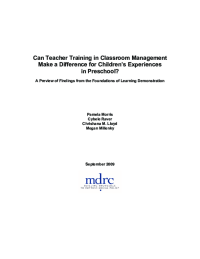Can Teacher Training in Classroom Management Make a Difference for Children’s Experiences in Preschool?
A Preview of Findings from the Foundations of Learning Demonstration
Policymakers recognize that early childhood education is a promising strategy for improving the school readiness of disadvantaged young children and for advancing their long-term academic success. Yet even as policymakers embrace greater investments in early childhood programs, they confront a difficult challenge: how can the quality of programs be maintained or enhanced when they are operated on a large scale? One critical aspect of quality is addressing children’s emotional and behavioral development — that is, their ability to engage positively with peers and teachers and to focus their attention and behavior during classroom activities. Evidence suggests that improving young children’s healthy emotional and behavioral development is both an important outcome in its own right and can also be a pathway to improved academic achievement. Recent research documenting high levels of behavior problems for children in preschool classrooms highlights the importance of this issue. Moreover, in survey after survey, teachers consistently emphasize their need for professional development and other supports to help them address children’s behavioral issues.
This report offers a preview of promising findings from Foundations of Learning (FOL), a demonstration and random assignment evaluation in Newark and Chicago of an intervention that trains preschool teachers to better support children’s behavior and emotional development. The model tested in Foundations of Learning combined teacher training in effective classroom management with weekly classroom consultation. Consultants coached and mentored the teachers in the new strategies learned in the training workshops and provided individualized support to the highest risk children.
The early results reported here are from the Newark demonstration, and they are well-aligned with findings from an earlier study of a similar demonstration, the Chicago School Readiness Project (CSRP). In brief, FOL and CSRP together provide evidence that the intervention:
- Improved teachers’ ability to effectively support children’s behavior and emotional development;
- Increased instructional time and created a positive climate for learning in classrooms;
- Reduced conflictual and acting-out behaviors by children; and
- Improved children’s ability to focus their attention, to curb their impulsivity, and to show greater engagement in the classroom.
The impact findings previewed here will be part of a future report scheduled for release in early 2010 that will also include findings on children’s transition into kindergarten in Newark.






